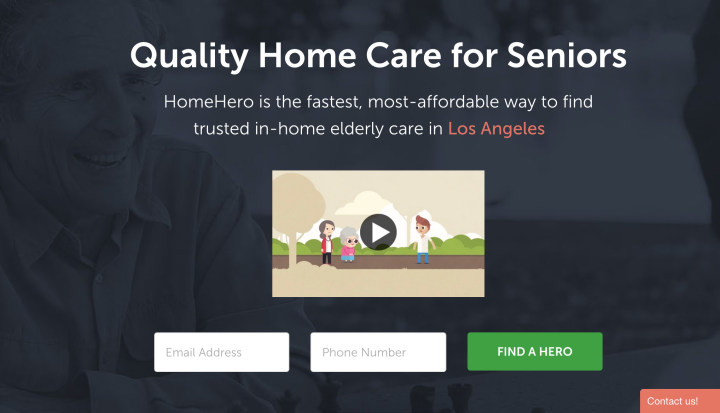
Co-founder Kyle Hill started HomeHero after realizing firsthand how difficult finding trustworthy caregivers for his grandmother in Seattle really was. Along with Mike Townsend, the entrepreneur decided to address the problem himself, and looked for ways to leverage tech in order to help families find, hire, and manage in-home caregivers for seniors by way of an online marketplace. Today, HomeHero maintains a database of hundreds of caregivers across California. By giving users the opportunity to view high-definition video interviews of potential applicants, HomeHero takes some of the guess work out of finding trustworthy guardians, even if you can’t be there to conduct an interview in person. And because HomeHero allows users and caregivers to send and receive payments online, as well as stay connected with daily text updates, out of sight doesn’t have to mean out of mind.
The online platform offers nonmedical services only, but covers a wide range of tasks including shopping, meal preparation, exercise, light housekeeping, companionship, and personal care. Since its founding in 2014, HomeHero has now grown to a team of 18 and recently secured $23 million in a Series A round of capital.
The secret behind HomeHero’s success, founders believe, lies in its proprietary algorithm, which can “crunch millions of data points in seconds and deliver customized caregiver matches within only 10 minutes, compared to hours or even days for traditional home care agencies.” Using k-means clustering, a type of machine learning particularly useful in examining large data sets to determine similarity based on probability, HomeHero is able to parse through the information of 1,500 certified caregivers across Los Angeles, Orange County, San Diego, and the San Francisco Bay Area.
Giving a specific example as to the algorithm’s application, HomeHero told me that a recent client “had very specific care needs and needed a caregiver with a wheelchair-accessible car who lived near him. Within minutes, the algorithm was able to find someone who has 15 years of experience with those exact skills and lives right down the street from the client.” And if you’re interested, here’s the formula applied by the algorithm:
[ (distance * .27) + (punctuality * .16) + (rating * .13) + (skills * .10) + (certifications * .07) + (language * .05) + (acceptance * .05) + (experience + .04) + (response * .04) + (availability * .03) + (earnings *.02) + (newness * .02) + (references * .02) ] * (gender) * (live-in)
So if you’re looking for a way to take care of loved ones from across the world, HomeHero may be able to help. Because not all tech is about smart jewelry.


